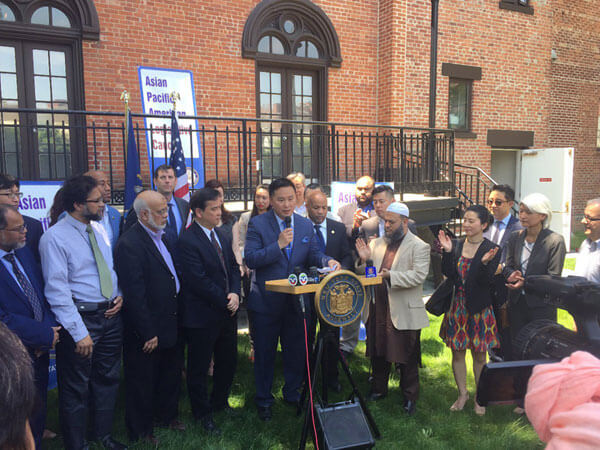By Gina Martinez
State Assemblyman Ron Kim (D-Flushing) and Assemblywoman Yuh-Line Niou (D-Manhattan) were joined by Assembly Speaker Carl Heastie (D-Manhattan) at Flushing Town hall last week to announce the formation of the Asian Pacific American Legislative Caucus.
The caucus will be the first state government body dedicated solely to researching and advocating for issues, policies and laws that affect New York’s Asian American community. These issues include immigration rights, small businesses, health and poverty.
Kim thanked Heastie, who he said was an integral part of putting the caucus together at the May 18 event. Kim was inspired by the Black and Latino Caucus and said it laid the foundation for an Asian counterpart like this to exist. “Black and Hispanic communities have understood the importance of making sure there is a structured voice in government,” Kim said. “It’s because of that caucus we were able to produce some of the most progressive, forward-thinking legislation this country has ever seen. This type of caucus initiative will lay the foundation, beyond just me and Yuh-Line. When we’re done with public service, this caucus will grow and make sure there is a sustained voice for all Asian-Americans in the state of New York.”
Kim worked closely with fellow assembly member Niou, who represents Manhattan’s Chinatown. Kim said they met six years ago and talked about a way to empower the Asian-American community in New York.
“It is both an honor and a privilege to announce the formation of this caucus because, for the first time in New York state history, there will be a group of legislators dedicated to working on the issues helping our state’s Asian- American communities,” Niou said. “This is a milestone moment. We represent 15 percent of the population on a city level and 9 percent in the state. Asian-Americans are the fastest-growing minority group in New York state, yet we remain vastly underrepresented at every level of government.”
During former President Obama’s administration, the White House initiative on Asian-American and Pacific Islanders reported that by 2050 Asian-Americans and Pacific Islanders would make up 9.7 percent of the total United States population with over 40 million people, according to Niou.
She said there is a serious absence of Asian-Americans in government. In 2015, only 2.4 percent of the people in Congress were Asian-American and that fewer than 2 percent of state legislators were.
“Ron and I of course like to joke that the number of Asians in the Legislature has literally doubled,” she said. “This is factual, but sadly it’s only Ron and me. Ron was the only Asian in the state Legislature until this year. My being elected made it technically double the number of Asians. There are zero Asian-Americans in the state Senate. Luckily for us, there are many of our colleagues who are not Asian-American, but represent districts where there is a notable Asian-American population and are aware of the issues our community face.”
According to a 2013 study done at NYU, incidents of poverty among Asian Pacific seniors is over 25 percent, with as many as 97 percent of the seniors foreign born compared to the general senior population. More than 22 percent of Asian Pacific residents under the age of 18 live in poverty.
Niou said chronic Hepatitis B disproportionately affects the Asian community and it needs to be a priority. She said of the nearly 1 million Americans living with chronic hepatitis B in the United States, half are APA, giving them a higher chance of being diagnosed with liver cancer. She also mentioned the serious stigma related to mental health and psychological treatment in the Asian community. In the Asian-American community, people who suffer from mental health issues often do so in silence, Niou said.
“We have an opportunity to shed a light on so many of these realties and discuss how we can culturally and linguistically appropriately serve this vulnerable population,” she said. “There is much more to be done for protecting Asian-American small businesses, immigrant rights, shedding light on causes of poverty in our community. These are just some of the issues we need to tackle in our caucus.”
Reach Gina Martinez by e-mail at gmart



































